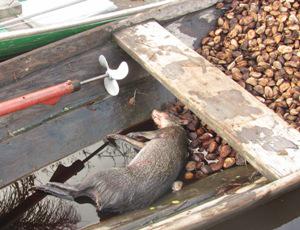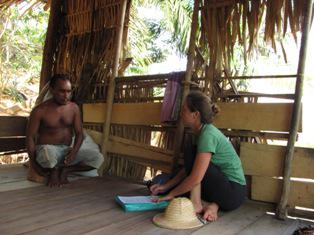Marina Albuquerque Regina de Mattos Vieira
Other projects
30 Apr 2014
Interactions Between Hunters and Wildlife in the Use of Salt Licks at the SDR Piagaçu-Purus, Amazonas State, Brazil
Our aims are to study traditional and formal regulations and its influences on actual hunting practices in 5 communities in the SDR Piagaçu-Purus, Amazonas, Brazil.

Game species hunted during the Brazilian nut season at the Lake Ayapuá.
Game species represent an important source of food security for rural communities in the Amazon. In spite of this, the Brazilian Law bans hunting practices, except in situation of starvation. This restrictive legislation makes game management untenable in most contexts. One of the only formal instruments of co-management of natural resources in the Brazilian legislation are the Sustainable Use Reserves (SDR), where the conservation unit residents are encouraged to partake in the management decisions in a deliberative fashion through the managing council and in the preparation of the Participative Management Plan.

Interview with local expertise.
Rural communities maintain local ecological knowledge (LEK) that can help ground formal management strategies in context to the socio-ecological setting. However, LEK is frequently neglected by decision makers about wildlife management, leading to decontextualized regulations in most cases. This project hopes to address the misfit between local and state notions about game management, while recognizing the necessity of involving local communities in wildlife management. This work will seek locally grounded suggestions for improving wildlife management strategies inside SDRs in Brazil that fit the socio-ecological context of Amazonian rural populations and more effective for wildlife conservation.
The SDR Piagaçu Purus (SDR-PP) was enacted in 2003 and is located at Lower Purus River, State of Amazon, Brazil. The project consists in two methods to be carried out with all residents of 5 communities in the SDR-PP: (1) participatory hunting monitoring; and (2) semi-structure interviews. The former consists in a pre-established hunting data sheet for self-monitoring in which each volunteer hunter complete with information about each hunt event. This will provide a reliable source of data about the current status of fauna while encouraging ongoing data collection by local people to follow fluctuations through time. Interviews will be used to investigate dietary taboos or prohibitions, sacred or avoided places, game preferences and avoidances, hunting methods and local agreements on territory, harvest and so on. I will also inquire about understandings of and compliance with laws and formal rules concerning game activities. This method will contextualize game practices observed in the participatory monitoring and elucidate which cultural and legal norms or constraints influence hunt patterns.
Thereby, we intent to cooperate with the implementation of a legal mechanism which allows participative management of wildlife more suitable with local reality, which may have legislative implications of SDR and wildlife management in general.